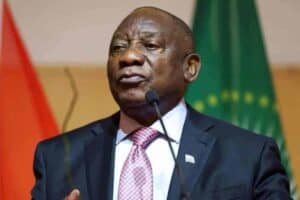The current political crisis around the private funding of Ramaphosa’s campaign should be understood within a certain context.

President Cyril Ramaphosa’s future as the leader of the ANC and South Africa is uncertain – he has his back against the wall and his ideological and political opponents from within the ANC are on the offensive.
The controversy surrounding the funding of his political campaign for the ANC presidency has provided them with enough ammunition to bring him down. The metaphorical meaning of the proverb “the sun sets before dawn” is playing itself out in the South African political context.
It is not going to be easy to push back the wave of counter-revolution which has manifested itself in various ways. And chief among those is the capturing and suffocation of the state by these forces of darkness.
For the purposes of scenario mapping, let us play around with this metaphor and try to give meaning to the political crisis engulfing the ANC and the impact this might have on us a nation.
First scenario: things are at their worst. The ANC’s lost decade of good governance and economic prosperity (2009- 2019) brought about political mayhem and administrative dysfunctionality. The institutionalisation of corruption through the pillaging of state resources and collapse of state institutions characterised this epoch.
The atmosphere of dismay and hopelessness prevailed for too long among the populace. The nation was woken from slumber by the civil society-driven #ZumaMustFall wave. The ANC remained unshaken by these revulsions. Instead, the ruling party hardened its attitude and built a very strong protective wall around Jacob Zuma.
It used its parliamentary majority to defend Zuma and went to the extent of taking collective responsibility for all his shenanigans. This got worse. Fast-forward, the ANC national elective conference that was held at Nasrec came and Ramaphosa was elected president of the ANC in December 2017.
Zuma was recalled in February 2018. Ordinary South Africans and some members of the ANC who were all fatigued by Zuma’s leadership mayhem breathed a sigh of relief. The promise of a “new dawn” was most welcome by many South Africans.
Ramaphosa’s ANC presidency brought the much-needed fresh air in the country’s body politic. The results of the 2019 general election came as a big shocker to the ANC. They meant that the ANC electoral downward trajectory was irrevocably swinging down with no hope of swinging up again.
The perpendicular had tilted against the ANC and its majority drastically reduced. What is clear is that the new dawn did not resonate well with South African voters. This also confirmed that the profile of the South African electorate is drastically changing.
The liberation heritage is no longer a carrot that the ANC can dangle in front of the voters. The swinging down of the ANC to 57.51% from 62.15% that it secured in the 2014 general elections is a clear confirmation that the voters are now wiser than before and can make informed choices.
Undoubtedly, this electoral downswing marked the beginning of Ramaphosa’s problems within the ANC – his political opponents surely were emboldened by this electoral decline. This was indeed a huge setback for Ramaphosa and it was clear from the onset that his political opponents from within would use the ANC fate to undermine him and destabilise and delegitimise his presidency.
The current political crisis around the private funding of Ramaphosa’s campaign should be understood within this context. It is not an isolated incident but an integral part of the total strategy to dethrone him. The Nasrec Faustian Pact is gradually melting down and the much-talked-about unity of the ANC is fast becoming a farfetched dream.
Second scenario: things will get better.
Unfortunately, these scenario will play themselves out in the not-too-distant future. Clearly, things will get worse as time goes on. The spirit of the new dawn is fast evaporating into thin air and the unemployment rate rose to 29% in quarter two of 2019.
The dark clouds are hanging over the heads of people who were hoping that the “new dawn” was going to deliver a better life for them by creating economic opportunities. Surely, under these economic difficulties, South Africa will not be an attractive investor destination.
A question therefore arises as to what is to be done? For Ramaphosa to survive the current political onslaught, he must, as a matter of urgency, put in place a new economic policy whose focus should be to kickstart the productive sectors of the economy, particularly manufacturing and agriculture.
If he fails to do so, his political opponents will nail him to the cross, forever and amen.
Maseti is a political economy analyst based in Centurion.
For more news your way, download The Citizen’s app for iOS and Android.






